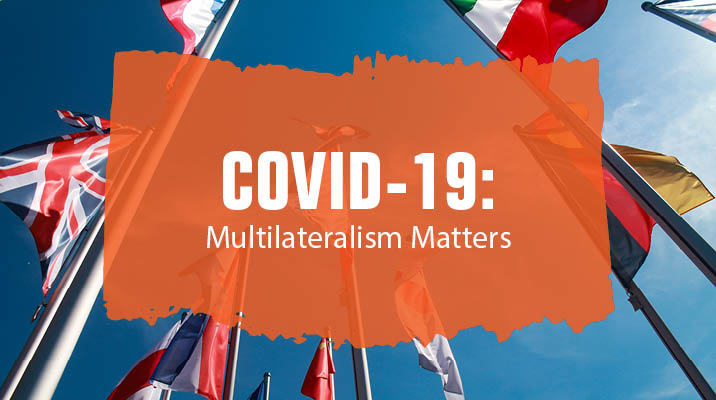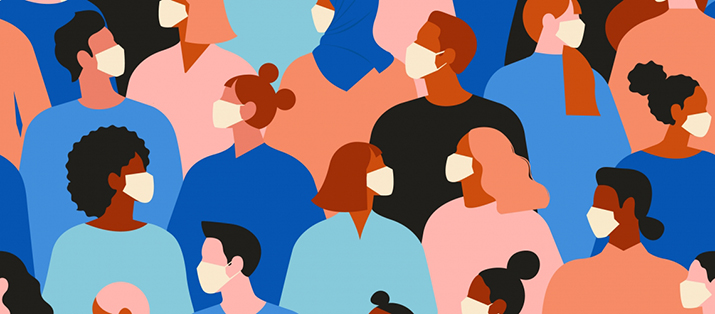HAPPENING AT THE UN
INTERNATIONAL DAY OF MULTILATERALISM AND DIPLOMACY FOR PEACE
We woke up one day and were risking our lives, our everything - all together. It happened everywhere around the same time. Yet we had structured the planet with very evident demarcations: borders and sovereign states, each with its own police, army, rules, symbols. Things were quiet. Maybe a war every now and then, when it was really inevitable, almost always for humanitarian reasons.
Instead, it seems that viruses do not take borders into account. On closer inspection, the economy, the environment, the lack of food, weapons (by vocation) and the internet (by definition) also seem stateless. Fundamentally, if someone sneezes in Wuhan there is a risk that a girl from Ipanema, a similar girl in Madrid and grandparents from Bergamo will fall ill. In the meantime, the airlines are closing.
No politician, economist, artist, diplomat or banker could explain it more clearly than Covid: that when the problems are global, the solutions are also global. And to think that for years on April 24 the United Nations has celebrated the International Day of Multilateralism and Diplomacy in favor of Peace. Not that there haven’t been any results so far, but perhaps the current crisis makes the need for each state to regain possession of the value of dialogue even more urgent, as Secretary General António Guterres has repeatedly emphasized. It is not just a question of "simply tackling global threats together", which wouldn’t be too bad, but as added by the UN headquarters, "of seizing all the opportunities together, because today we have the opportunity to build inclusive economies and societies which are truly sustainable, with a greater awareness than in the recent past.”
The virus has exacerbated vulnerabilities and social inequalities
To some it seems obvious, to others less so, Maria Dolens repeats it every night, a hundred times. Yet when things go wrong, not only because of the pandemic, instead of teaming up, everyone thinks of themselves. On one side of the ocean someone yells "America first" and on the other there is always someone who answers "us too". The problem is that it doesn't even work under normal conditions, let alone in a crisis like the one we are experiencing.
With the pandemic we have plunged into a health and economic abyss that had not been seen for almost a century. The impact will be particularly strong in the years to come and the effects risk undermining the progress made in areas such as poverty, food security, gender equality and sustainable development.
The virus has aggravated social inequalities and usually this is reason enough to make us stop listening to others. But the same Covid has highlighted that the systems we depend on are highly interdependent. If we continue to advance in no particular order, and at very different speeds, not only will we be unable to face the consequences of the health emergency, but we won’t be able to face the climate crisis, the illegality in cyberspace or the risks of nuclear proliferation either.
We have the opportunity to build inclusive and truly sustainable economies and societies
The High Representative of the European Union for Foreign Affairs and Security Policy, Josep Borrell, has stressed that the pandemic is shaking "the foundations of our societies and exposing the vulnerabilities of the most fragile countries". It is clear that the virus exacerbates existing conflicts and generates new geopolitical tensions and above all it reminds us that Peace, democracy and prosperity must be constantly nurtured.
Essentially, there is a need for a network in which the UN and its agencies, international financial institutions, regional organizations and individual countries collaborate more effectively and with ever stronger ties. We need to build an inclusive system that draws on key contributions from civil society, businesses, foundations, the research community, local authorities, cities and regional governments. An attitude such as this, argues Guterres, "will help lead to effective multilateralism with the mechanisms it needs to make global governance work where it is needed."
The virus is a disaster, but at least it could leave us with the knowledge that nobody can save themselves alone. And perhaps a "neutral" place, such as Colle di Miravalle, could be the ideal place to reconnect the threads of dialogue between countries that need to clarify different bilateral issues. Multilateralism is conquered gradually.
The pandemic generates new geopolitical tensions and reminds us that dialogue must be constantly nurtured








